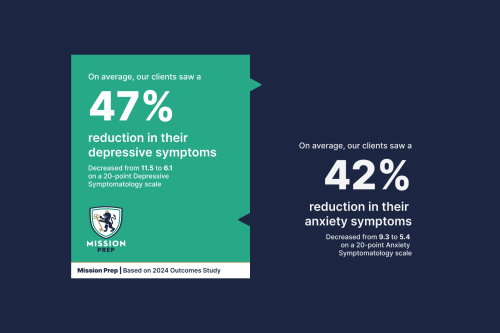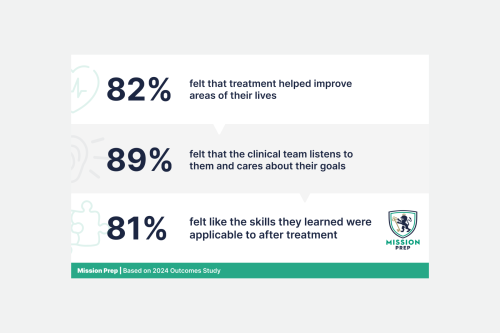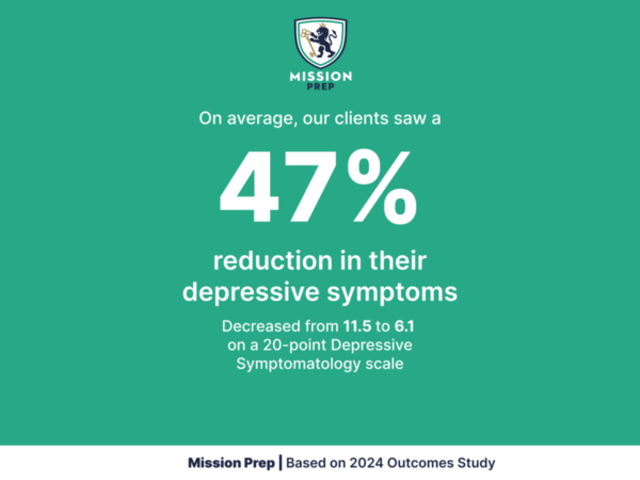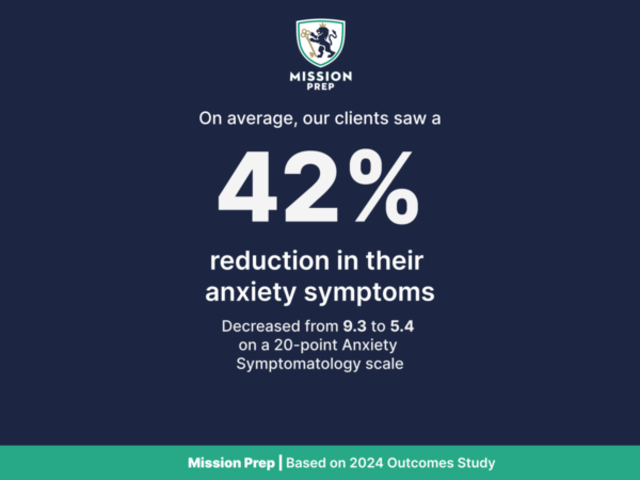








Mission Prep Teen Treatment
Verified Center
This provider's information has been quality-checked by Recovery.com's Research Team for accuracy and completeness, including center verification through appropriate third-party organizations.
Treatment Focus
This center treats mental health conditions and co-occurring substance use. You receive collaborative, individualized treatment that addresses both issues for whole-person healing.
Primary Level of Care
Offering intensive care with 24/7 monitoring, residential treatment is typically 30 days and can cover multiple levels of care. Length can range from 14 to 90 days typically.
Treatment Focus
This center treats mental health conditions and co-occurring substance use. You receive collaborative, individualized treatment that addresses both issues for whole-person healing.
Primary Level of Care
Offering intensive care with 24/7 monitoring, residential treatment is typically 30 days and can cover multiple levels of care. Length can range from 14 to 90 days typically.
Provider's Policy
Mission Prep works with most PPO insurance plans, which can cover 100% of treatment costs after deductibles and out of pocket are met. Our insurance experts offer a free, confidential benefit verification to provide you with a clear understanding of the potential costs at our facility and how to make the most of your insurance benefits.
Mission Prep Teen Treatment
Mission Prep Teen Treatment
About Mission Prep Teen Treatment
Mission Prep stands as a sanctuary of healing, nestled in the tranquil surroundings of Waterford. A versatile mental health oasis offering residential, outpatient, and virtual care, it specializes in the comprehensive mental well-being of adolescents. The essence of its approach lies in the belief that true recovery flourishes beyond traditional therapy and medication.
Within the comforting embrace of their facility, every detail is carefully curated to nurture both mind and body. From the continuous, personalized care available around the clock to creating a warm, supportive atmosphere, every aspect of their program is designed with strategic intent and deep compassion. Mission Prep goes beyond standard treatment modalities by incorporating chef-prepared, nutritious meals and fostering nurturing therapeutic relationships, all underpinned by a commitment to evidence-based methods. Each step on the journey towards wellness is thoughtfully designed to ensure a holistic path to recovery.
Integrative Mental Health Treatment for Teens
Mission Prep uses comprehensive assessments to learn more about client’s symptoms, history, challenges, and strengths. With this understanding, they craft treatment plans that match their strengths and challenges. They treat primary and co-occurring:
- Depression
- Anxiety
- Trauma
- Post-Traumatic Stress Disorder (PTSD)
- ADHD, ADD
- Mood and Thought Disorders (Bipolar, Schizophrenia, etc.)
- Suicidality
- Academic and Social Challenges
- Technology Addiction
Mission Prep’s weekly clinical programming includes medication management, multiple individual sessions weekly, weekly family therapy, and case management.
Individualized, Evidence-Based Care
Mission Prep’s evidence-based, compassionate approach addresses the root causes of mental health concerns, complemented by medication when necessary. Licensed practitioners use cognitive behavioral therapy (CBT), dialectical behavior therapy (DBT), eye movement desensitization and reprocessing (EMDR), acceptance and commitment therapy (ACT), and more. Clients receive 2 weekly individual counseling sessions, weekly family therapy, and 2 weekly clinical mentoring sessions. Mission Prep incorporates mindfulness practices throughout their program to enhance the evidence-based treatments effectiveness. Embracing a holistic approach to recovery, Mission Prep offers specialized groups, including Rock to Recovery, nutrition sessions, gardening groups, art therapy, and yoga classes. Clients also engage in life skills training and psychoeducation.
A Comfortable Residential Home in Virginia
Nestled in tranquil Waterford, Mission Prep’s residential center offers a serene, home-like environment. The 6-bed house boasts semi-private rooms, cozy living areas, specialized therapeutic spaces, and a picturesque backyard complete with a relaxing porch. Teens are encouraged to bring personal items like cell phones, chargers, and musical instruments such as guitars. Clients can use cell phones and laptops under staff supervision. Following residential care, Mission Prep extends comprehensive aftercare services with family follow-up counseling and connections to community resources.

Highlights from the Center
Highlights
These highlights are provided by and paid for by the center.
Holistic Approach
Wellness Emphasis
Adolescents
Trauma Treatment
Center Overview
Treatment Focus
This center treats mental health conditions and co-occurring substance use. You receive collaborative, individualized treatment that addresses both issues for whole-person healing.
Joint Commission Accredited
The Joint Commission accreditation is a voluntary, objective process that evaluates and accredits healthcare organizations (like treatment centers) based on performance standards designed to improve quality and safety for patients. To be accredited means the treatment center has been found to meet the Commission's standards for quality and safety in patient care.

Mission Prep Teen Treatment
Insurance Accepted




Our Centers
Recovery.com Verified Listing
Recovery.com verified that the name, location, contact information and license to operate for this treatment provider are valid and up-to-date.

Joint Commission Accredited

Licensed by Virginia
Recovery.com is an independent, third-party mental health resource. Verification does not imply endorsement and does not guarantee the quality of treatment services.
Meet Your Care Team

Aja Chavez
National Executive Director

Dr. William Dodge
Medical Doctor

Jude Levasseur
Psychiatric Nurse Practitioner

Jason Shipley
Associate Executive Director

Michelle Murphy
Clinical Director

Mawra Shaffi
Program Manager

Sofia Shahid
Therapist

Caitlin Chaudhry
Nurse LPN

Samantha Buckland
Chef
Your Care Options
Specializations
Adolescents
Teens receive the treatment they need for mental health disorders and addiction, with the added support of educational and vocational services.
ADHD, ADD
ADHD is a common mental health condition caused by dopamine imbalance. Common symptoms include inattention, hyperactivitiy, and impulsivity.
Anxiety
Anxiety is a common mental health condition that can include excessive worry, panic attacks, physical tension, and increased blood pressure.
Depression
Symptoms of depression may include fatigue, a sense of numbness, and loss of interest in activities. This condition can range from mild to severe.
Licensed Primary Mental Health
Some primary care providers offer mental health diagnosis and treatment. This can prevent patients from developing more serious conditions.
Suicidality
With suicidality, a person fantasizes about suicide, or makes a plan to carry it out. This is a serious mental health symptom.
Trauma
Some traumatic events are so disturbing that they cause long-term mental health problems. Those ongoing issues can also be referred to as "trauma."
Gender-Specific
Separate treatment for men or women can create strong peer connections and remove barriers related to trauma, shame, and gender-specific nuances.
Who We Treat
Adolescents
Teens receive the treatment they need for mental health disorders and addiction, with the added support of educational and vocational services.
LGBTQ+
Addiction and mental illnesses in the LGBTQ+ community must be treated with an affirming, safe, and relevant approach, which many centers provide.
Treatment Services
Licensed Primary Mental Health
Some primary care providers offer mental health diagnosis and treatment. This can prevent patients from developing more serious conditions.
Residential
In a residential rehab program, patients live onsite, with access to daily treatment and 24-hour care. An average stay is 30-90 days.
Approaches
Evidence-Based
A combination of scientifically rooted therapies and treatments make up evidence-based care, defined by their measured and proven results.
Family Involvement
Providers involve family in the treatment of their loved one through family therapy, visits, or both–because addiction is a family disease.
Holistic
A non-medicinal, wellness-focused approach that aims to align the mind, body, and spirit for deep and lasting healing.
Therapies
1-on-1 Counseling
Patient and therapist meet 1-on-1 to work through difficult emotions and behavioral challenges in a personal, private setting.
Meditation & Mindfulness
A practiced state of mind that brings patients to the present. It allows them to become fully aware of themselves, their feelings, and the present moment.
Play Therapy
This approach is commonly used with children. It incorporates elements of play and self-expression, like boardgames, finger painting, dolls, and blocks.
Trauma-Specific Therapy
This form of talk therapy addresses any childhood trauma at the root of a patient's current diagnosis.
Mindfulness Therapy
This ancient practice can be mental, emotional, and even spiritual. In meditation, you focus your attention on the present moment without judgement.
Attachment-Based Family Therapy
ABFT is a trauma-focused therapy that teaches you to form healthy relationships by rebuilding trust and healing attachment issues formed in childhood.
Art Therapy
Visual art invites patients to examine the emotions within their work, focusing on the process of creativity and its gentle therapeutic power.
Equine Therapy
Guided interactions with trained horses, their handler, and a therapist can help patients improve their self-esteem, trust, empathy, and social skills.
Conditions We Treat
Schizophrenia
Schizophrenia is a serious mental health condition that causes hallucinations, delusions, and disordered thinking.
Grief and Loss
Grief is a natural reaction to loss, but severe grief can interfere with your ability to function. You can get treatment for this condition.
Personality Disorders
Personality disorders destabilize the way a person thinks, feels, and behaves. If untreated, they can undermine relationships and lead to severe distress.
ADHD, ADD
ADHD is a common mental health condition caused by dopamine imbalance. Common symptoms include inattention, hyperactivitiy, and impulsivity.
Anger
Although anger itself isn't a disorder, it can get out of hand. If this feeling interferes with your relationships and daily functioning, treatment can help.
Anxiety
Anxiety is a common mental health condition that can include excessive worry, panic attacks, physical tension, and increased blood pressure.
Bipolar
This mental health condition is characterized by extreme mood swings between depression, mania, and remission.
Burnout
Burnout entails mental and physical exhaustion, and leads to a severe lack of fulfillment. This condition is often caused by overwork.
Substances We Treat
Co-Occurring Disorders
A person with multiple mental health diagnoses, such as addiction and depression, has co-occurring disorders also called dual diagnosis.
Languages
Aftercare
Care Designed for Your Needs
Personal Amenities
Amenities
Special Considerations
Flexible technology policies
Centers with flexible technology policies allow professionals to stay in touch with work and give patients a greater sense of connection and normalcy.
Gender-specific groups
Patients in gender-specific groups gain the opportunity to discuss challenges unique to their gender in a comfortable, safe setting conducive to healing.
Activities
Yoga
Yoga is both a physical and spiritual practice. It includes a flow of movement, breathing techniques, and meditation.
Off-Site Activities
Off-Site Amenities

Learn More About the Center
Residential Mental Health Treatment
Learn more about the offerings in their structured residential program.
Mood and Thought Disorder Treatment
Explore how Mission Prep tailors treatment for mood and thought disorders.
What Sets Them Apart
Discover the unique offerings and read the mission at Mission Prep.
Technology Addiction Recovery
Learn more about what treatment looks like for internet addiction.





